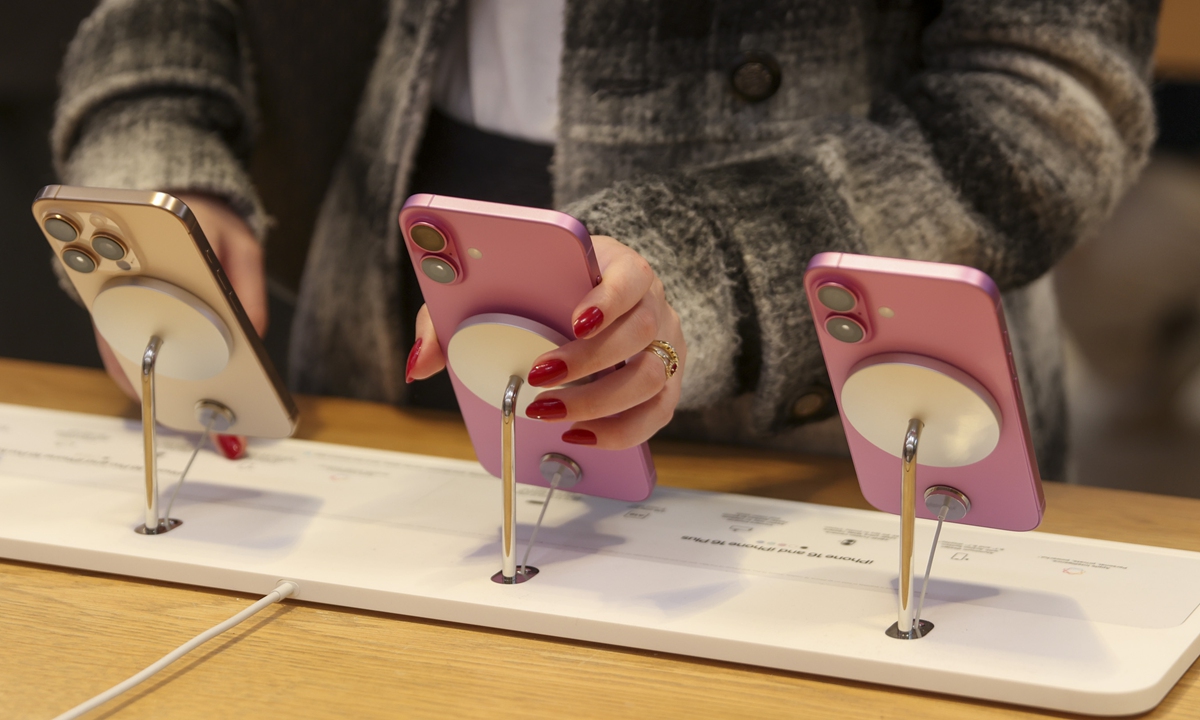
People browse the iPhone display at Fifth Avenue Apple Store in New York, US on April 4, 2025. Photo: VCG
The US administration has granted exclusions from steep reciprocal tariffs to smartphones, computers and some other electronics imported largely from China, providing a big break to tech companies like Apple that rely on imported products, Reuters reported on Saturday. A Chinese expert said on Sunday the exclusions are within expectations because of US consumers' rigid demand for many Chinese goods, while projecting more exemptions are likely, or the US' inflation will skyrocket in the short term.
In a notice to shippers, the US Customs and Border Protection agency published a list of tariff codes excluded from the import taxes. The exclusions are retroactive to 12:01 am EDT on April 5, according to Reuters.
The agency listed 20 product categories, including the broad 8471 code for all computers, laptops, disc drives and automatic data processing. It also included semiconductor devices, equipment, memory chips and flat panel displays, it said.
For the Chinese imports, the exclusion only applies to the US administration's reciprocal tariffs, which climbed to 125 percent this week, according to a White House official. The US administration's prior 20 percent duties on all Chinese imports that the official said were related to the US fentanyl crisis remain in place, Reuters said.
"The exclusions are made out of pragmatic considerations, since the main victims of US' steep reciprocal tariffs are American users who have to pay extremely higher prices for many products," Lü Xiang, a research fellow at the Chinese Academy of Social Sciences, told the Global Times on Sunday, noting that "American consumers have rigid demand for many Chinese goods."
Lü said the tariff reprieve might also be a result of US tech giants' pressure on the US government as part of their self-rescue. "For example, US tech firm Apple is one of the biggest beneficiaries of globalization. Its products are designed in the US, while iPhones are manufactured and sold across the world," he said, adding that steep tariffs would be a disaster for the multinational.
The iPhone 16 Pro Max 256 GB, which is among the devices that are assembled in China, retails for $1,199. Under the new tariffs on Chinese imports, the price of the device could rise by $675, or 56 percent, lifting the price tag to $1,874, an April 9 analysis from UBS Investment Research shows, CBS News reported.
The exemption is "the first sign of any softening" of the US administration's tariffs against China, the Financial Times reported.
The dispensation for smartphones and computers will be especially welcomed by Apple as the bulk of its supply chain is centered on China. Analysts estimate about 80 percent of its iPhones are still made in China even as the tech group worked to diversify production to India in recent years, the report said.
Dan Ives, an analyst with US financial services firm Wedbush, called the US' exemptions the "best possible news for tech investors" that lifts a huge cloud over the sector, as US tech giants had virtually no alternatives outside of their Asia-based supply chains, Fortune reported.
"Without these exemptions the US Tech industry would be taken back a decade and the Al Revolution thesis would have been slowed significantly," Ives wrote in an X post on Saturday.
The US' tariff exemptions will probably extend to cover more products, Lü said. "It is difficult for US consumers to find replacements for many staple goods still produced in China, and accordingly the US' high tariffs will push up US' domestic inflation in the short term. It's an easy thing for US' inflation to skyrocket in May or June," he said.
New York Federal Reserve President John Williams said on Friday the US administration's current trade policies will accelerate inflation this year, while adding that it's critical for the US central bank to prevent longer-run expectations of price pressures from becoming unmoored, Reuters reported.
Williams said he expects the tariffs to push inflation up to between 3.5 percent and 4 percent this year, which would represent a marked rise in price pressures from the current level of the Personal Consumption Expenditures Price Index, which was 2.5 percent on a year-over-year basis in February.
"It's the time for Washington to calm down and re-evaluate the profound adverse impacts of its sweeping tariffs on its trade partners, including China. Exerting maximum pressure on China will not achieve its goal and the US must seek a reasonable solution for its own economic woes," Xiang Ligang, director-general of the Beijing-based Information Consumption Alliance, told the Global Times on Sunday.
According to The Washington Post, while the US tariff campaign has primarily targeted high-profile sectors such as steel, automobiles and consumer electronics, the US administration warned on Tuesday that a wide range of medications, whose active pharmaceutical ingredients are predominantly sourced from China and India, could soon become the next focus.
Health experts cautioned that the consequences may be swift, as tariffs "could disrupt pharmaceutical supply chains," increasing the cost of generic drugs, and "place additional strain on an already burdened health-care system," the report said.




